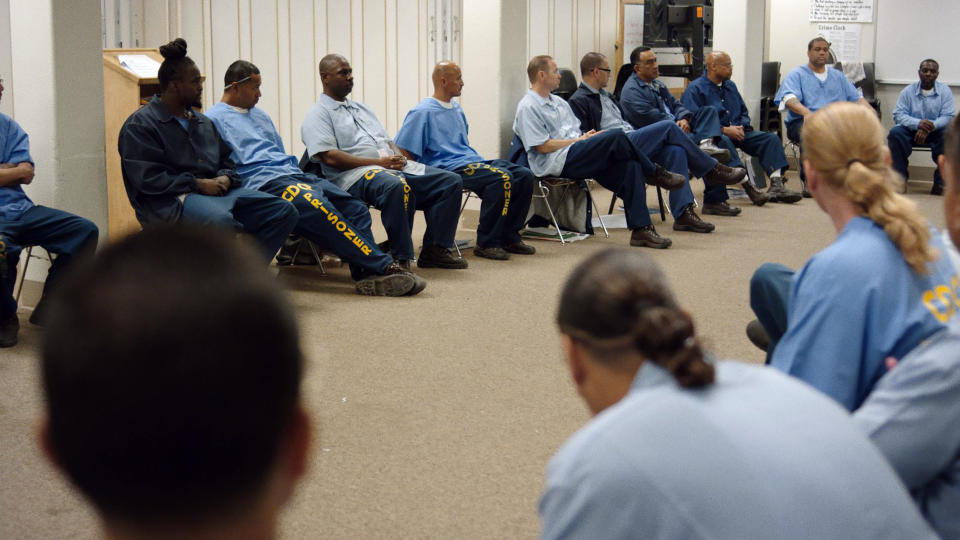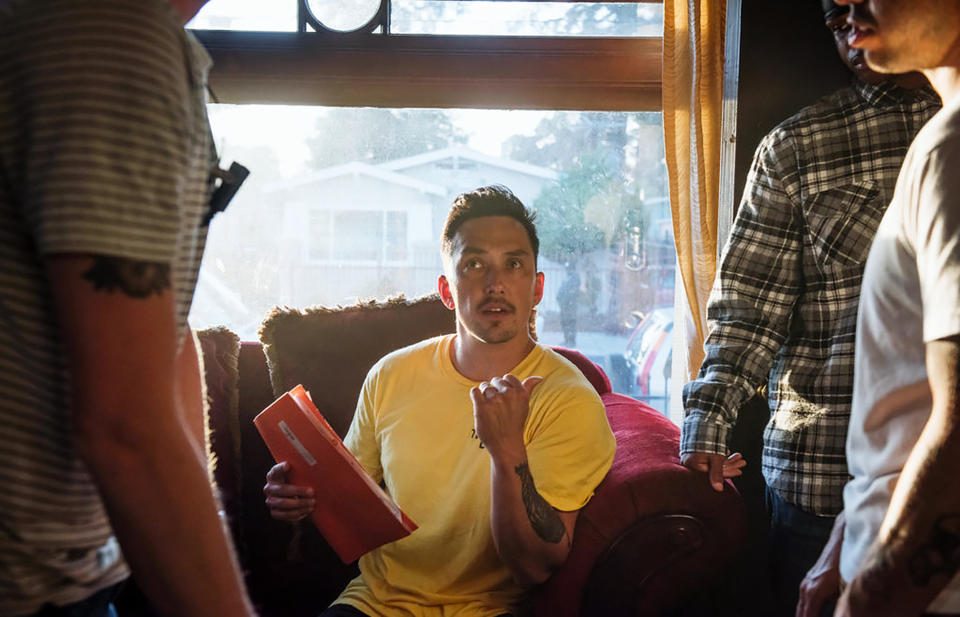'The 50': This Dad Became 1 Of First Incarcerated Drug Counselors
Cameron Clark was 13 years old when he was indoctrinated into the Compton Crips, given a handgun and started selling drugs.
After learning the various quantities of marijuana sold and amount for each, he says he stood outside until 12:30 at night. He recalls he made $500.
“I slept on the living room floor,” Clark, 47, tells TODAY.com. “The street light was shining a beam of light through the living room. I reached into my pocket, pulled out the money, put it in the light and counted it. And I just started crying — that was the cost of my innocence.”
At 15, Clark was found guilty of being an accessory to second degree murder and was sentenced to life in prison. It was while incarcerated that Clark says he finally faced his family's generational cycle of abuse and, as a result, became one of the first imprisoned substance abuse counselors in the country.
Now, in a new film called "The 50," about the first group of men to become counselors while in California prisons, Clark is sharing his story.
'I never thought I would come home'
In 2006 — after a federal judge ruled the conditions of the California prison system were so bad they amounted to "cruel and unusual punishment," and after California state passed a law requiring rehabilitating programing — the offender mentor certification program (OMCP) was formed.
The OMCP helps people serving life sentences become trained and certified drug counselors.
“I was incarcerated longer than I had ever been on the streets,” Clark says. “I never thought that I would come home. I never thought that I’d see the reflection of self in a little person. I never thought I would have a child — that any of those things were possible for me.”
It was possible. First, Clark became one of the first incarcerated substance abuse counselors in the country. Then on January 25, 2011, Clark was released from prison after becoming eligible for parole.
He is now the father of four.
'I was full of anger'
Clark grew up in an abusive household. His mother was an alcoholic and a drug addict, he says, and Clark quickly became the focus of her ire. Seeking refuge, Clark moved in with his aunt.
It was while staying with his aunt that he says he was indoctrinated into a gang and taught how to sell drugs so he could "contribute" financially to the family.
At 15, Clark was sentenced to life in prison. He was first sent to Youth Authority, what is now called the Division of Juvenile Justice.
"I didn't have any support," Clark explains. "I was full of anger, wondering why I was there and blaming the world."
It was during his time at Youth Authority that Clark met another incarcerated youth who was also from Compton — his victim's nephew.
Clark says he was prepared to fight to defend himself from what he assumed would be physical retaliation from his victim's nephew. The two met on the prison yard, in a "blind spot," Clark armed with a straight razor.
Instead, his victim's nephew started sharing personal stories about his uncle.
"He was trying to humanize this person," Clark says. "I was so confused; I had never encountered anything like that in my life."
After that experience, Clark says, he started to "seek his change."
'The best counselors in the country'
It would take years before Clark stepped away from gang culture for good. He got his GED. He started to learn a trade while incarcerated. He was moved to a state prison.
Clark applied to be part of the pilot program for prison counselors in 2006 and faced his own childhood trauma — his mother beating him with a crowbar; the days he had to walk over his mother's body on the way to school after his father broke her back. Only then, he says, was he able to reform.
His transformation, along with two others, is documented in the feature-length film 'The 50."
"You had to do your own personal work to become a therapist. You had to talk about your own trauma your own grief stuff," Thomas Gorham, the executive director of Options Recovery Services, a substance abuse recovery program, who created the model for OMCP, said in the film.
"If they didn’t do that, they couldn’t really work with another inmate because they would avoid those subjects. That produced the best counselors in the country."
In the film, men share deeply personal traumatic events: One man speaks about his aunt's murder and her calling his name as she died. Another how anger drove him to nearly kill his best friend. Another detailing the moment he admitted to his crimes.
"We really had to look at our lives," Clark shares. "We had to pull up the roots. Why is my belief system the way it was? It goes back to parenting issues; back to upbringing; we had to evaluate all that. And it was hard for some people — some people didn't move forward and allowed their emotions to overwhelm them in group sessions. But if you were willing to sit and go through that process, and deal with self and explore that little boy that was abused, and forgive yourself and those who abused you, you were able to heal — and we all healed together."

Clark shares that he tried to talk to his mother about his childhood — she refused. He didn't talk to her again for three years.
"When I did finally call my mother again, she started crying," Clark says. "I told her I just wanted to know what happened."
'I was healing by telling you my story'
It was during that conversation, that Clark says his mother shared that she had been sexually abused by his grandmother, beaten by his father and by his stepfather.
In a written letter, Clark's mother told TODAY.com and the makers of "The 50" film that Clark had her permission to tell her story as he explained his own.
"I began to realize she was a whole person and just a little girl," Clark says. "It's not just all about me — it's a generational thing. We cried together. I was able to tell her about some of the abuse that I went through, not just with her but as a result of her not being in my life. We needed to share each other's abuse."
In a particularly poignant part of the film, Clark's mother acknowledges her drug and alcohol use and the abuse they both endured.
"I don’t hold no fault for what took place in the past. I was going through what I was going through in the prison system but I didn’t know how to change — I didn’t know who Cameron was because I had been this character for all this time," Clark told his mother. "I needed something to help me change and it was you — I said: she is the keys."
"You were healing by telling me your story, I was healing by telling you my story," he added. "And that’s where I found my best friend."
As the men faced the generational traumas that have shaped their life, they were better able to counsel others — including those who were not part of the program but could see how their fellow inmates were changing.
"Initially, nobody said anything — we were afraid to expose ourselves; to be seen as 'weak' in the eyes of other people, because we had to go back to the prison yard," Clark explains. "We didn't know that it as going to be transformative, and it was."
Out of the first 50 to go through the program, 37 graduated and became the nation's first incarcerated substance abuse counselors.
'It is informing how I parent both my children'
Brenton Gieser, director and producer of "The 50," is a father of two. As he filmed Clark and the other two subjects of the film — as well as the most recent graduating class of incarcerated substance abuse counselors — he said he was also learning about fatherhood.
"I was shifted by them, just being in their presence," Gieser tells TODAY.com. "Seeing some of the most 'masculine men' — 'alpha males,' so to speak — with their hearts wide open, I found beauty in these people. That's the kind of man I want to be. That's how I want to show up in the world. That's the way I want my son to be."

After five years, Clark was released from prison after becoming eligible for parole.
Shortly after, while working as a substance abuse counselor at Option Recovery Services, he found out he was going to be a father.
"It was like seeing something new for the first time — seeing color for the first time," he shares. "It was redemption. People are always talking about generational curses, and how certain traumas are being passed down throughout the generations and families. I was going to break that."
Clark says his time in state prison and the tools he learned during the counselor program has shaped his parenting.
"There are particular things that I do and I'm conscious of when raising my kids" Clark explains. "For example, when I'm telling my son something I get on my knees and I look in his eyes and I explain to him what I'm saying. He also needs to know who he is as a young Black man in society. Nobody taught me about being a young Black man or how I might be perceived by others."
'I needed to do something for me — for that little boy'
Over 500 men and women have graduated from the offender mentor certification program since its inception. People who participate in educational programs like OCMP are 43 percent less likely to end up back in prison, according to one large study by the RAND Corporation.
"Any time I talk about it I get emotional," Clark says. "Inmates teaching inmates made (the program) so monumental, because we were able to meet each other where we were."
In 2018 Clark founded DOVE, an organization that works to prevent the incarceration of young men and help transition those leaving prison back into society. "Dove" was the name Clark was given on the streets of Compton.
"'Dove' was something the streets cursed me with. I wanted to give that back as a blessing," Clark says. "I created an acronym for it: Developing Organizing Visions for Everyone. I created a non-profit, and that's how I give back to that little boy."
Related video:
This article was originally published on TODAY.com

